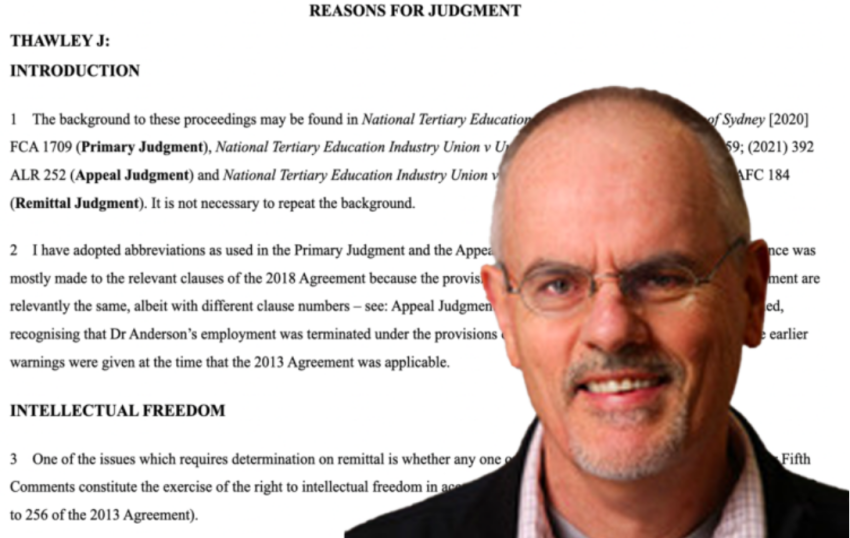
The Federal Court ruled in favour of former University of Sydney lecturer Tim Anderson and the National Tertiary Education Union (NTEU) in an appeal over Anderson’s termination of employment that concluded on October 27.
Anderson’s employment was terminated over a series of social media posts and public statements that the University considered to be misconduct.
These included a series of public arguments with journalists over media coverage of his involvement in a 2017 conference on conflict in Syria, and posts and emails about the university’s handling of the matter.
The university also viewed lecture material produced by Anderson, which featured an Israeli flag with a swastika superimposed over it, as “offensive and derogatory”.
Anderson also posted an image of tutor Jay Tharappel wearing a Houthi patch reading, “God is the greatest, death to America, death to Israel, curse on the Jews, victory to Islam”.
Anderson and the NTEU took the university and former Provost Stephen Garton to court in 2019, after they sacked him over his controversial statements.
Anderson and the NTEU argued that the university’s actions violated Anderson’s right to academic freedom, and that the university took adverse action against him by punishing him for public commentary on University processes in accordance with his labour rights.
The 2019 decision found that Anderson’s termination did not violate the Fair Work Act 2009. The court found that, while a commitment to intellectual freedom did exist within the enterprise bargaining agreement, any academic rights were qualified by the requirement that conduct be “in accordance with the highest ethical, professional and legal standards”.
On appeal last year, the Federal Court found that the primary judge erred in judging that there was no enforceable legal right to academic freedom.
Justices Allsop, Jagot and Rangiah found that the university’s Code of Conduct was an “inferior document” to the enterprise agreement in which the commitment to upholding intellectual freedom was contained.
As the appeal could only rule on matters of law, the appeal judgement put to the primary judge Justice Thawley the question of whether Anderson’s rights to intellectual freedom had in fact been violated.
Thawley found that Anderson was exercising his intellectual freedom.
On Anderson’s comments to journalists, the court decided that Anderson was defending his work via engaging in public debate, and did not engage in harassment or vilification.
Regarding the “Gaza Graphic” in Anderson’s lecture slides, Thawley acknowledged that the material could be considered offensive, but did not take it to be harassment, intimidation or vilification.
Concluding that the graphic was made for an academic purpose, Thawley said in his judgement: “I do not draw an inference ‘that the superimposition of the swastika over the flag of Israel was a form of racial vilification intended to incite hatred of Jewish people’”.
As such, the court concluded that the university had violated Anderson’s employment rights by terminating his employment.
Stephen Garton, currently principal advisor to the Vice-Chancellor, was also found liable as an accessory based on his role in the termination.
President of the University of Sydney NTEU Branch, Nick Riemer, told Honi Soit: “The principle of academic freedom is always going to be hardest to uphold with controversial positions, especially given the pressure universities are under from the Israel lobby.
“Regardless of your views on Anderson, everyone who is serious about universities should welcome this decision. It shows once again that it’s the NTEU, not university management, that is the guardian of the fundamental principle of academic freedom.”
The university said: “We are disappointed by today’s decision, which focused on just one aspect of the proceedings initially brought against the University. We note that we previously succeeded in having all other aspects of the proceedings dismissed. We will now take time to review the decision and consider our response and next steps. We won’t make further comment on this matter at the current time.
“The University is deeply committed to the expression and protection of intellectual freedom in line with the principles set out in our Charter of Freedom of Speech and Academic Freedom.
“These fundamental freedoms are critical for staff, students, the University and our society at large; we remain firm in our belief that they should be exercised responsibly and according to the highest ethical, professional and legal standards.
“We also believe that civility and respect should be particularly valued when people disagree with each other.”
[This article was first published in Honi Soit. It is republished with permission.]